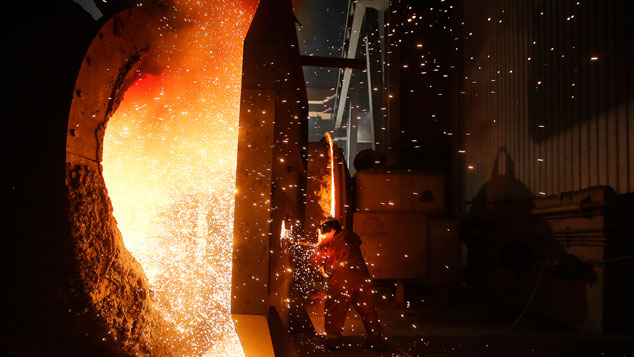
On Question Time last week, one of the main topics under discussion was the steel industry. Why, one of the audience asked, when we were so quick to bail out the banking sector when it imploded in 2008, are we not immediately stepping in to save the UK’s failing steel industry?
It’s a common question. And there’s a fairly standard answer on offer from the standard array of politcians. It is that we should be bailing out steel, just as we did the bankers. Steel, as one of my fellow panelists noted last week, is an “iconic” industry, particularly in Scotland, and it must be protected at all costs.
This was and continues to be nonsense. Grandstanding drivel even. As I said on the night, you can argue that a state (and its taxpayers) should step into rescue an industry if its problems are very short term and if it is systemically important to your economy as a whole. That was the case with the banks. They were experiencing extreme, but short-term liquidity crises. Everyone involved in the bailout assumed that they would return to health in a few years (which they have). And everyone agreed that, maddening as it is in lots of ways, the UK needs a healthy financial industry and expects to have one over the long term.
This isn’t the case with the steel industry. It very probably doesn’t have a long-term future in the UK – other people run perfectly good (maybe better) blast furnaces for less. So all money put into it will be money lost (not the case with the banks). And, while I have some sympathy for the ‘what will we build submarines out of in WWIII?’ argument, I’m not sure the strategic argument is enough in itself. We don’t really need our steel industry.
So, saving the steel industry is, I’m afraid, something of a waste of all of our money. The same would go for throwing public money at any other declining industry. Two local newspapers shut down last week a mere 20 miles from where Question Time was broadcast last week. Newspapers are “iconic” to Scotland too. But I heard no one clamouring to bail them out – to save the jobs of the local journalists and editors whose “way of life” would be threatened by the closures. Why?
“You can’t compare journalists and steelworkers”, sniffed one member of the audience at another panel I spoke on the next day. Can’t I? Why can’t I? What makes a steel worker, who has been in the job for 20 years, a more deserving person than a newspaper production editor, who has been in the job for 20 years? They are both skilled workers in declining industries. If we save one, why not the other? Why fetishise steel workers – or any old-style manufacturing workers for that matter – over workers in the service economy? It makes no sense (and is mildly insulting to those of us who aren’t steel workers), and we taxpayers shouldn’t let our politicians get away with it. Enough with the hard-hat grandstanding.
One final point here. It seemed to be the general view of the Question Time panel, and an awful lot of other people, that if you don’t save the steel industry, you can’t help steel workers. What else can they do, say the grandstanders. This is worse than nonsense. It is patronising nonsense. Steel working is skilled stuff. With proper support (however gold-plated that support is, it can’t cost more than bailing out an entire industry), why can’t a steel worker be retrained to work in another sector, should they want to, in exactly the same way as anyone else with a high level of skill?